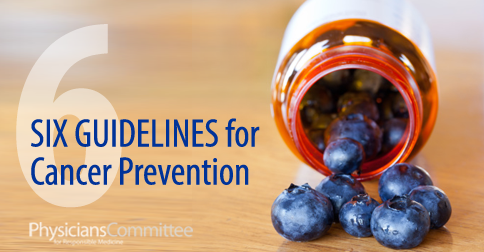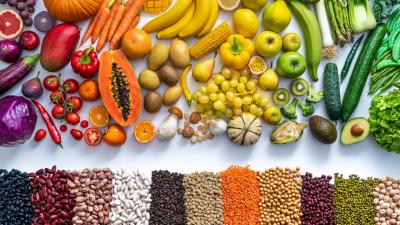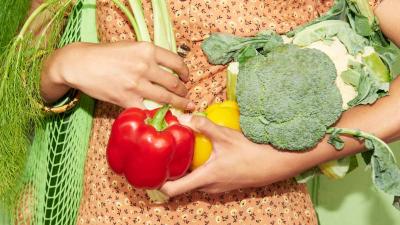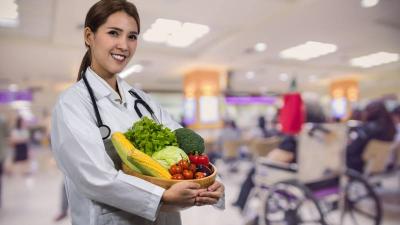Prevent Cancer Costs by Preventing Cancer

A new report shows that global spending on cancer drugs reached $100 billion last year—a 10.3 percent increase from 2013. Experts predict that, at this rate, spending on cancer medicine will reach $147 billion by 2018. But we could potentially save billions by halting the rise of lifestyle cancers. Approximately one-third of cancer cases are preventable, according to the World Health Organization. And the American Institute for Cancer Research states that a healthy diet and other lifestyle changes can prevent an estimated 340,000 cancer cases per year. Physicians Committee doctors and dietitians released a list of six dietary recommendations to help individuals lower their cancer risk. Read the recommendations below to learn how you can help improve your health. After all, prevention is the best form of treatment!
The six dietary recommendations to reduce risk of several types of cancer are:
1. Limit or avoid dairy products to reduce the risk of prostate cancer.
Findings: Consuming thirty-five grams of dairy protein each day, the equivalent of one large cup of cottage cheese, increases risk of prostate cancer by 32 percent. Drinking two glasses of milk each day increases risk of prostate cancer by 60 percent.
2. Limit or avoid alcohol to reduce the risk of cancers of the mouth, pharynx, larynx, esophagus, colon, rectum, and breast.
Findings: One drink per week increases risk of mouth, pharynx, and larynx cancers by 24 percent. Two to three drinks per day increase risk of colorectal cancer by 21 percent.
3. Avoid red and processed meats to reduce the risk of cancers of the colon and rectum.
Findings: Each 50-gram daily serving of processed meat, equivalent to two slices of bacon or one sausage link, increases risk of colorectal cancer by 21 percent. Each 120-gram daily serving of red meat, equivalent to a small steak, increases risk of colorectal cancer by 28 percent.
4. Avoid grilled, fried, and broiled meats to reduce the risk of cancers of the colon, rectum, breast, prostate, kidney, and pancreas.
Findings: Four types of heterocyclic amines (HCAs) are associated with cancer of the colon and rectum. HCAs form from creatine and amino acids in cooked skeletal muscle, increasing with higher cooking times and higher temperatures. When ingested, HCAs can disrupt DNA synthesis.
5. Consume soy products to reduce risk of breast cancer and to reduce the risk of recurrence and mortality for women previously treated for breast cancer
Findings: Evidence from Asian and Western countries shows that soy products are associated with reduced cancer risk. Chinese women who consume more than 11.3 grams of soy protein, equivalent to half a cup of cooked soybeans, each day during adolescence have a 43 percent reduced risk of premenopausal breast cancer, compared with women who consume 1.7 grams. Research in Shanghai shows that women with breast cancer who consume 11 grams of soy protein each day can reduce mortality and risk of recurrence by about 30 percent. U.S. populations show similar findings: the higher the isoflavone intake from soy products, the less risk of mortality and recurrence in women with breast cancer.
6. Emphasize fruits and vegetables to reduce risk of several common forms of cancer.
Findings: Fruits and vegetables, especially leafy greens, help reduce overall cancer risk. A high intake of cruciferous vegetables, such as broccoli, kale, and cabbage, is associated with an 18 percent reduced risk of colorectal cancer and reduced risk of lung and stomach cancers. Women who consume the most carotenoid-rich vegetables, such as carrots and sweet potatoes, lower their risk of breast cancer by 19 percent. Overall, women who consume the highest quantities of any kind of fruit or vegetable reduce breast cancer risk by 11 percent. A high intake of tomato products has been shown to reduce risk of gastric cancer by 27 percent. Garlic and other allium vegetables, such as onions, significantly reduce risk for gastric cancer, while a Western diet (high amounts of meat and fat with minimal amounts of fruits and vegetables) doubles the risk.








